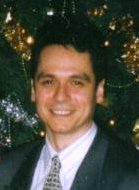"Happiness is…balance"
Back in the early nineties, I was at a point in my life where I should have been happy. I had a great job as an IT Manager with great pay. I owned a nice car. I was in great shape taking martial arts. I was single and doing the bar scene regularly. And on the outside, I had the perfect bachelor life.
Then why was I so miserable on the inside? I felt like something was missing, but I couldn’t peg it.
Shortly after my cousin introduced me to the angel board (thats another blog). It was short of like the Ouija board, but the purpose was to specifically contact your guardian angel. I had a bad experience with the Ouija previously (again, another blog), and was extremely wary. But, I tried it anyway.
It turned out to be one of the most enlightening events of my life. Really inspiring. One of the questions I asked, amoung other things, was why I wasn't happy. The reponse I received was that happiness wasn't a destination, it was a state of being. It was a choice. And once you choose to be happy, it becomes a belief. And that belief powers the events around you.
The problem is I thought it was a destination. Once I have this, this, and that, then I'll be happy. The problem is that we can't always control what happens in our life and if one of those items aren't acheived we feel like we've somehow failed and fallen farther from happiness. Even if we acheive all the things on the imaginary slate in our head, it's human nature to always want more. So a new list is created. And the reality is we could never complete the list.
It sounded a bit too simple to me. So, then I asked once the choice to be happy is made, how do we know we're happy? The response was that once the decision was made, we need to focus on the five areas in our life that create balance. We feel happy when we feel equally content with ourselves in each of the five areas:
- Physical: How we feel about our physic being in relation to our diet, weight, cardio, etc.
- Mental: How we feel in relation to our mental state. Do we feel challenged mentally in relation to our work, education, finance, etc.
- Emotional: How we feel about our personal one on one loving relationships. Those relationships could be our mate, parent, child, close friend, family, etc. The key is do we feel content that those loving one on one relationships with the key people in our lives is healthy. That list of people to focus on will be different for each of us.
- Social: We are social animals by nature and we need to make sure we don't ignore the social aspect of ourselves. Do we feel content that we're seeing enough of our friends and family from a social aspect. Simply to let loose and have fun with our family and friends.
- Spiritual: Do we feel content about ourselves spiritually. And that means something different for each of us. Whatever you label and envision God as, the Father, Jesus, the Holy Spirit, Allah, Buddha, Krishna, Mother Earth, the Higher Spirit, the great universal energy that binds the universe, the One, or the infinite other aliases. Do you feel content that you are in touch with your inner spirit self that binds you to the higher spirit.
The five areas can be thought of as five equally spaced spokes of a wheel balanced in the center by a pole. Focusing too much or too little on one area throws the wheel of happiness out of balance and we start to feel something is off or even missing in our life.
This analogy made perfect sense to me. How many people did I know in school that focused almost exclusively on one or two areas at the expense of the others. My computer hacker friends that focused heavily on the mental and social aspects of their tight inner circle of friends at the expense of their physical, emotional, and spitual states. Or my high school jock friend that focused heavily on his physical, social, and emotional states (at least he seemed like they always had a cheerleader girlfriend) at the expense of his mental and spiritual states.
The test is to say to yourself, "I am happy physically" (or mentally, emotionally, etc). You will immediately feel good about that statement, or feel like somethings off. If it doesn't feel right, it means you need to focus on that area of your life.

